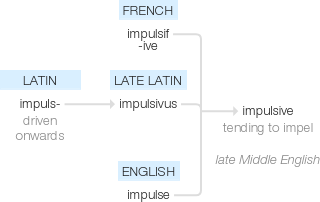Impulsive
late Middle English (in the sense ‘tending to impel’): from French impulsif, -ive or late Latin impulsivus, from Latin impuls- ‘driven onwards’ (see impulse). impulsive (sense 1) dates from the mid 18th century.
wiktionary
Borrowed from Middle French impulsif, from Latin impulsivus.
etymonline
impulsive (adj.)
early 15c., originally in reference to medicine that reduces swelling or humors, from Medieval Latin impulsivus, from Latin impuls-, past participle stem of impellere "strike against, push against" (see impel). Meaning "having the property of impelling" (of force, cause, energy, etc.) is from c. 1600. Of persons, "rash, characterized by impulses," from 1847, from impulse. Earlier, at least once, in reference to maniacs:
The impulsive insane are often irritable, restless and jealous. Sometimes they have delusions, and sometimes not. Their delusions frequently seem to have no connection with their outbreaks of violence. They are often the best and at the same time the most dangerous class of patients in the asylums. They have little of the charity of the world, are most likely to be punished for their offences, and yet have the least control over their conduct. ["Impulsive and Homicidal Insanity," Boston Medical and Surgical Journal, April 19, 1843]
